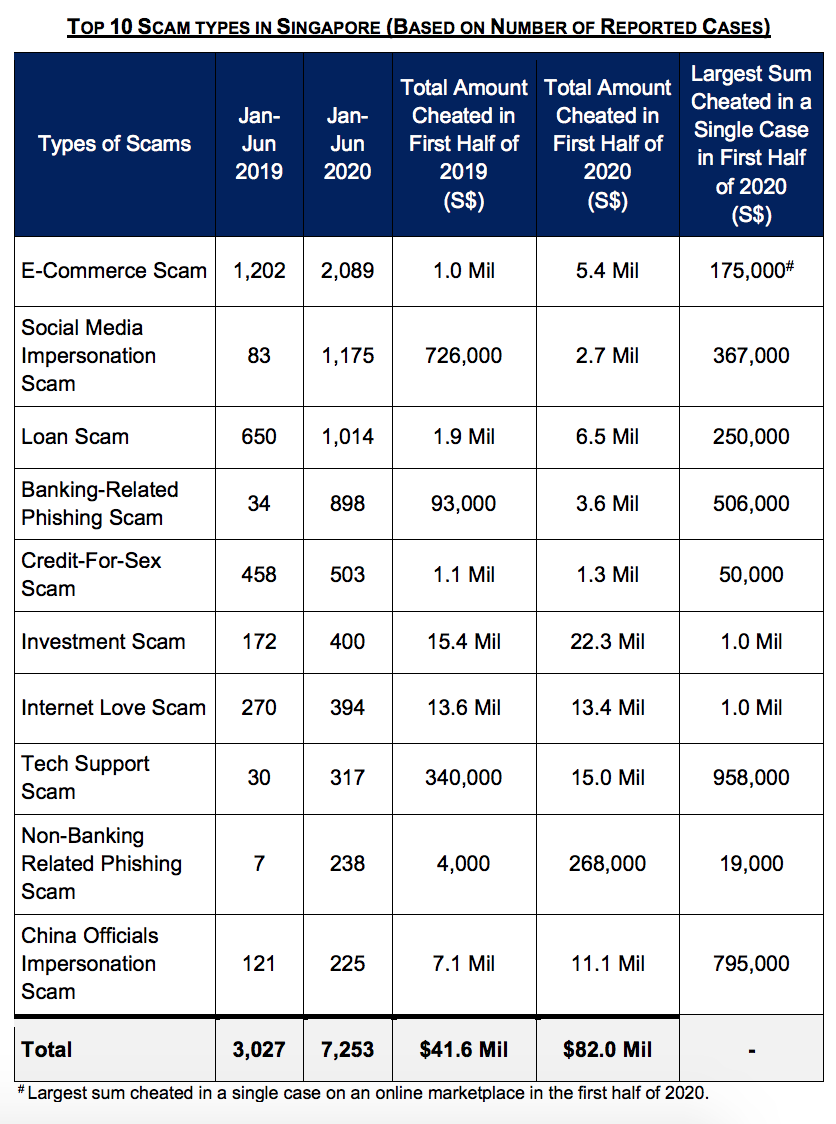The overall number of crimes reported from January to June 2020 has risen by 11.6 per cent compared to the same period in 2019 — but mainly due in part to the rise in scam cases.
According to statistics released by the Singapore police, scams contributed significantly to the increase.
If scam cases were excluded, the overall number of crimes reported in the first half of 2020 would have decreased by 20.5 per cent compared to the first half of 2019.
This sudden growth in scam cases is due largely in part to the increase in online transactions Singaporeans carried out during the pandemic period.
Most common types of scams
1. E-commerce
The money cheated for the top 10 most common types of scams amount to S$82 million for the first half of this year, double the S$41.6 million reported in the same period in 2019.
E-commerce scams, social media impersonation scams, loan scams, and banking-related phishing scams made up the majority — 71 per cent of the top 10 scam types reported.
E-commerce scams are the most common, comprising 2,089 cases of the total 18,121 cases this year.
This was an increase of 73.8 per cent from last year.
The total amount cheated increased to S$5.4 million in the first half of 2020, with the largest sum cheated in a single case being S$175,000.
In this case, the victim bought a carton of surgical masks on Carousell. After making payment though, the seller become uncontactable and did not deliver the masks.
Carousell was the platform on which the most number of e-commerce scams took place.
However, the proportion of e-commerce scams on Carousell has declined by two per cent from 2019.
Only three out of 10,000 transactions on the platform are fraudulent as well, according to a news release by Carousell.
 Screenshot from SPF
Screenshot from SPF
2. Social media impersonation scams
The second-most common type of scam are social media impersonation scams.
The number of such scams increased tenfold in 2020 (1,175 cases) from the same period in 2019 (83 cases), with the total amount cheated being S$2.7 million.
Often, victims were tricked into disclosing personal details like their mobile number, credit card information and One-Time Passwords to scammers.
These scammers typically use fake or compromised social media accounts to impersonate victims' friends or followers on Instagram and Facebook.
They would then lure victims by claiming to help them sign up for fake online contests and promotions. Victims would find out that unauthorised transactions had been made from their bank accounts or mobile wallets.
The largest sum cheated in one case was S$367,000.
According to police, the victim had responded to a link on a purported monetary grant her friend had sent her via Facebook messenger.
She then transferred the sum of money and also provided her personal details like her bank account to an unknown person.
3. Loan scams
Loan scams are the third-most common type of scam in 2020.
The number of cases increased by 1,014 in the first half of the year, double last year, while the total amount cheated tripled to S$65 million.
The largest sum cheated in a single cases of S$250,000, when a victim responded to an unsolicited text message offering loan services.
Here are the statistics for the top 10 types of scams in the first half of 2020.
 Screenshot from SPF
Screenshot from SPF
And here's a nifty graphic summarising the statistics.
New anti-scam education campaign coming soon
To combat the rising number of scams, the police has ramped up efforts such as forming an Anti-Scam Centre (ASC) in June 2019.
The ASC collaborates with banks, fintech companies, online marketplaces and telecommunication companies identify such crimes.
They also use track islandwide scam trends and analyse data, which facilitates enforcement operations.
Public education about scams will also be continued, and efforts will be focused on the online community.
Together with the National Crime Prevention Council, the police will be launching a new anti-scam public education campaign called ‘Spot the Signs. Stop the Crimes.’, on Aug. 27.
The campaign will run till March 2021 and aims to educate the public on how to spot telltale signs of various scams.
Totally unrelated but follow and listen to our podcast here
Top photo by Ashley Tan
If you like what you read, follow us on Facebook, Instagram, Twitter and Telegram to get the latest updates.
